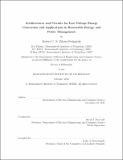Architectures and circuits for low-voltage energy conversion and applications in renewable energy and power management
Author(s)
Pilawa-Podgurski, Robert C. N
DownloadFull printable version (4.546Mb)
Other Contributors
Massachusetts Institute of Technology. Dept. of Electrical Engineering and Computer Science.
Advisor
David J. Perreault.
Terms of use
Metadata
Show full item recordAbstract
In this thesis we seek to develop smaller, less expensive, and more efficient power electronics. We also investigate emerging applications where the proper implementation of these new types of power converters can have a significant impact on the overall system performance. We have developed a new two-stage dc-dc converter architecture suitable for low-voltage CMOS power delivery. The architecture, which combines the benefits of switched-capacitor and inductor-based converters, achieves both large voltage step-down and high switching frequency, while maintaining good efficiency. We explore the benefits of a new soft-charging technique that drastically reduces the major loss mechanism in switched-capacitor converters, and we show experimental results from a 5-to-1 V, 0.8 W integrated dc-dc converter developed in 180 nm CMOS technology. The use of power electronics to increase system performance in a portable thermophotovoltaic power generator is also investigated in this thesis. We show that mechanical non-idealities in a MEMS fabricated energy conversion device can be mitigated with the help of low-voltage distributed maximum power point tracking (MPPT) dc-dc converters. As part of this work, we explore low power control and sensing architectures, and present experimental results of a 300 mW integrated MPPT developed in 0.35 um CMOS with all power, sensing and control circuitry on chip. The final piece of this thesis investigates the implementation of distributed power electronics in solar photovoltaic applications. We explore the benefits of small, intelligent power converters integrated directly into the solar panel junction box to enhance overall energy capture in real-world scenarios. To this end, we developed a low-cost, high efficiency (>98%) power converter that enables intelligent control and energy conversion at the sub-panel level. Experimental field measurements show that the solution can provide up to a 35% increase in panel output power during partial shading conditions compared to current state-of-the-art solutions.
Description
Thesis (Ph. D.)--Massachusetts Institute of Technology, Dept. of Electrical Engineering and Computer Science, 2012. Cataloged from PDF version of thesis. Includes bibliographical references (p. 337-343).
Date issued
2012Department
Massachusetts Institute of Technology. Department of Electrical Engineering and Computer SciencePublisher
Massachusetts Institute of Technology
Keywords
Electrical Engineering and Computer Science.